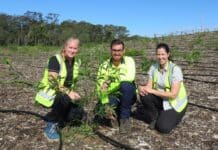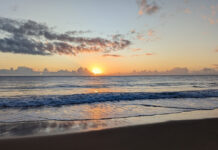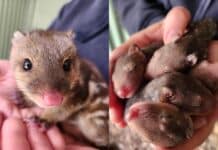Rangers at the Mon Repos Conservation Park work year-round to protect turtles nesting on the region’s beaches but now they’re asking for the community’s help through the Reducing Urban Glow project.
The rangers, through the Department of Environment and Science, are one of the project partners in the project's community engagement working group.
The Reducing Urban Glow project will see a network of light sensors installed along the region’s coastline to measure light pollution. The data collected will be available to residents via an online map.
Ranger Shane O’Connor said there were plenty of studies confirming that urban glow impacted nesting and hatchling turtles.
“Any artificial light that is not letting them see what they need to see will mean they’re not going where they need to go,” Shane said.
“The mums like dark beaches and what we’re finding is the more lights around the beaches the less mums that come to lay their eggs.
“We’ve known for quite a while how light effects our turtles and it’s really important that we manage our lights here if we want to look after our turtles.”
While rangers have been working to rectify the issue through vegetation projects he said every resident had a role to play in Reducing Urban Glow.
“We have a good vegetation screen to protect our beach here at the moment but over the years we’ve realised we’re getting an artificial light glow that is coming or transcending over the top of that.
“So just having this vegetation here is not enough anymore and that’s where reducing the urban glow fits into the bigger picture.”
Reducing Urban Glow project for our turtles
Shane said Mon Repos and the natural phenomenon it was host to was a treasure worth preserving.
“I think it’s very unique because we get such an amazing animal, an endangered species, coming to nest on this very small beach in high numbers.
“Everyone knows about biodiversity and what’s happening around the world and if we’ve got something like this, such a remarkable animal that you know is a big part of our reef, and if we can look after it we’re helping to look after the environment, the world.”
He said anyone assisting with the Reducing Urban Glow project would help the region’s “triple bottom line”.
“So first is social: it’s really good for people to have a common goal, it brings people together.

“Then you’ve got the economic: everyone knows that a lot of people come to Mon Repos to view the turtles, they stay in our area for a couple of days, they’re spending money.
“The last one, that I’m really concerned with, is environmental. We can look after a part of the world and protect it.”
Shane said he thought Reducing Urban Glow was a wonderful project and encouraged the community to engage with the program and look out for the launch of the online heat map, expected by late this year.
“I think it’s very important. We realised early on, protecting the turtles wasn’t just for the parks and wildlife service to do, it’s for the broader community.
“It’s not just Mon Repos anymore it’s become the Bundaberg Region, the Woongarra Coast.
“Anyone that can help us out is going to help the turtles.”
Reducing Urban Glow community engagement group chair and Greenfleet CEO Wayne Wescott said it was vitally important the community worked together to protect the park.
“Mon Repos Conservation Park … is a global treasure,” Mr Wescott said.
“It supports the largest concentration of nesting marine turtles on the eastern Australian mainland and records the most significant loggerhead turtle nesting population in the South Pacific region.
“Artificial coastal lighting is one of the major threats to the turtle population.”
While many partner organisations had come together to deliver the project he said it could only succeed with the cooperation of residents.
“In the end, the only long-term approach to this issue is to harness the support of the local community to reduce lighting voluntarily and support any appropriate government action on managing public lighting.”
For more on the Reducing Urban Glow project head to www.bundaberg.qld.gov.au/knowyourglow.
The Bundaberg Regional Council project has been supported by the Australian Government under the Smart Cities and Suburbs program, Queensland Department of Environment and Science, Ergon Energy, Burnett Mary Regional Group, Central Queensland University, The Prince’s Trust Australia and Greenfleet, Bundaberg Tourism and Sea Turtle Alliance.
- Related stories: Recycled fencing a win for turtles and environment







